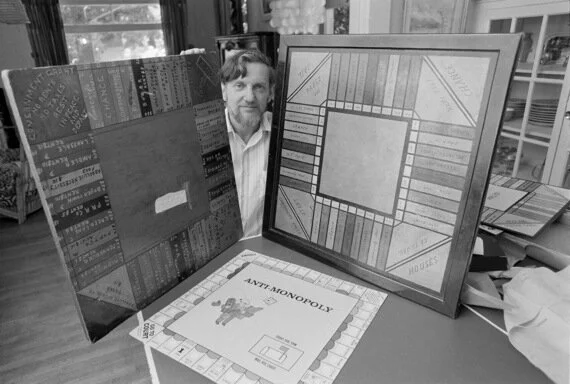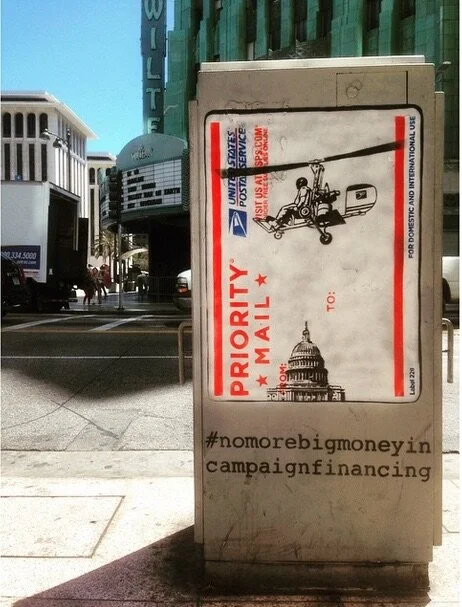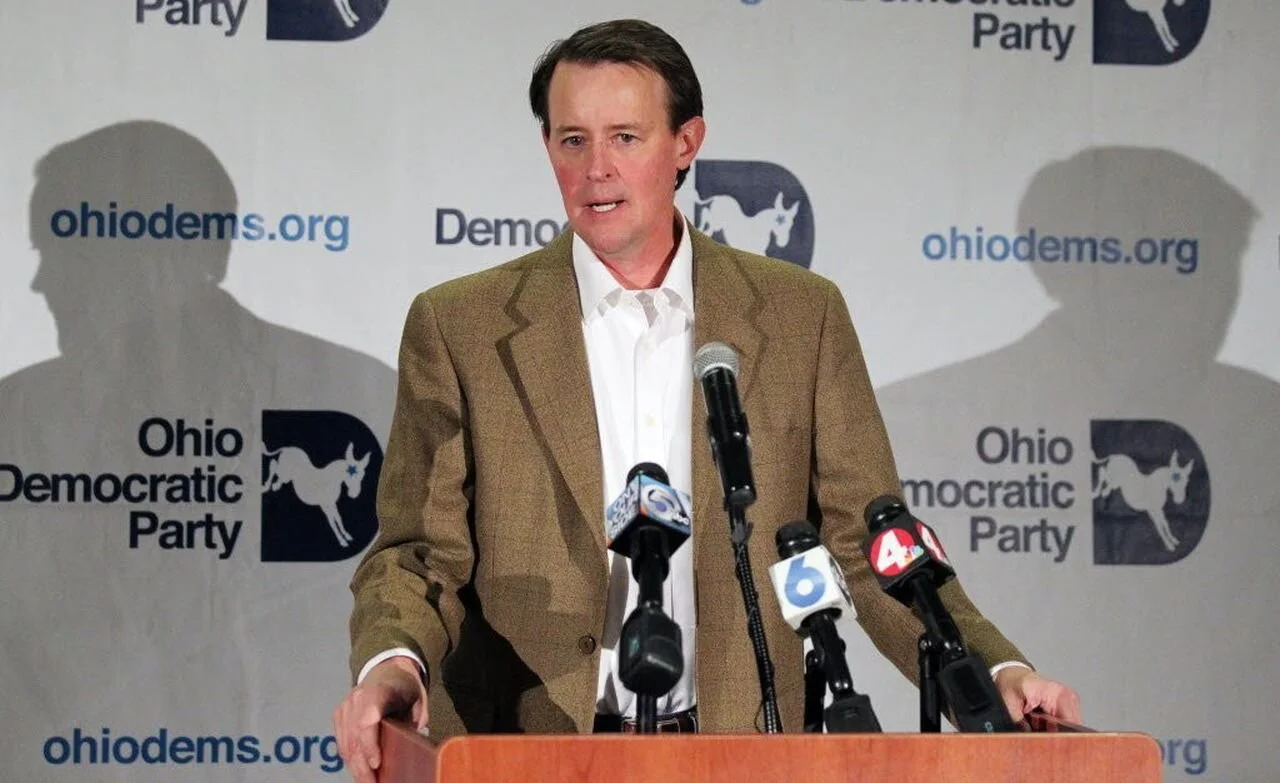Doug Hughes did not have a Super PAC. He did not have the clout of a major donor. But he did have a gyrocopter.
Citizens United, Explained With Dogs
This election cycle shows that the impacts of Citizens United are no laughing matter, with more anonymous money flowing through our elections than ever. While our campaign finance laws may have gone to the dogs, our democracy does not have to. On Election Day, use your voice at the polls, because you don’t want just any old hound dog representing your needs.
President Obama Is Right: It’s Time for Mandatory Voting
“It would be transformative if everybody voted. That would counteract money more than anything. If everyone voted, it would completely change the political map in this country. Because the people who tend not to vote are young, they’re lower income, they’re skewed more heavily towards immigrant groups and minority groups. And, you know, there are often the folks who are scratching and climbing to get in to the middle class, and they’re working hard. There’s a reason why some folks try to keep them away from the polls, we want to get them into the polls. So that might be a better strategy, in the short term,” [Referring to the time it takes to pass a constitutional amendment.]
The Pay 2 Play Board Game, More Realistic Than Monopoly!
Something about the game Monopoly seemed like the right metaphor for our priced-out political process—perhaps because the player with the most money wins, just like in almost all elections. But upon discovering its true origins as an educational folk game taken over by a corporation, I realized how appropriate Monopoly really is as a symbol for the corporate takeover of our democracy.
Ohio Democratic Party Chair Forced Out
In the wake of Republicans‘ easy victories Tuesday, Chris Redfern announced he would be stepping down as the chair of the Ohio Democratic Party. The writing had been on the wall for Redfern in recent weeks, whose snide comments the Ohio press had become inured to. But when Redfern mocked his own party’s candidate for governor to The New York Times, what had been an open secret of an abusive relationship between a man and his party finally had to be confronted.
Wool Over Our Eyes: We Need Disclosure Laws Now
It is sad that it should come to this, but the reality of today’s governance is that spending money in politics offers a greater return on investment than any other form of enterprise — up to $22,000 percent according to the Journal of Law & Politics, and at the state level that ROI is doubled. You and I might think it unconscionable to turn a room full of people raising their hands to vote into a showroom of masked people shouting at you. But then, corporations have no conscience.
Democracy in Ohio is Hard Enough Already
Over the years of making these documentaries, a number of would-be candidates have told me that they cannot run while Chris Redfern is chairman, because he has ostracized them and put others on notice that they are disloyal to the party if they dare side against him. It’s like potential candidates are getting mugged before stepping out the door to run for office, already a thankless undertaking. These kinds of rivalries, how-dare-you-question-me-I-banish-thee, these are the kinds of feuds propagated by a Palin.
‘This Is Your Country,’ My #MayDayin30 Video
I believe that we can use the modern tools available to spread awareness and empower citizens, and that our collective stories can affect revolutionary reform. It is why I am committed to storytelling as a medium for activism, with citizen journalism today serving as oversight.
I am excited to participate in MayDay PAC‘s new video competition, #MayDayin30, where anyone can submit an ad either about money in politics or for specific candidates MayDay PAC is backing. Winners are selected by votes from peers and finalists selected by a panel that includes Lawrence Lessig, Marianne Williamson, and Shepard Fairey. I encourage you to submit!
I decided to take a satirical approach to a classic PSA — the vintage “This is your brain on drugs” commercial, which probably did more to sell bacon than deter drug use.
We have the power; we just have to take it.
Our Pay to Play System, Embodied by Beanie Babies
When investigators into missing funds from the BWC found over $13 million unaccounted for in Noe’s records, it was all the more remarkable as to what did comprise Noe’s $50 million portfolio of Ohio funds: Rare coins. Beanie Babies. Le Bron James jerseys. George W. Bush shot glasses. You know, collectibles. When some of these coins came up missing, that didn’t help, as did records presented by his partner in court proving that some of the coins never existed.
Playing Monopoly With Our Lives
Even the very rules of Monopoly violate anti-trust legislation that has been in place for generations. These are the kind of laws that helped America grow and thrive, like preventing corporations from discriminatory pricing in railroad shipping. This is the same Interstate Commerce Act cited in the Supreme Court’s ruling over the implementation of the Affordable Care Act (aka Obamacare) as to whether or not the federal government can be involved in regulating state health insurance programs. Those who were mad that others’ healthcare was not taken away are probably the same ones who prefer to own all the railroads and utilities in Monopoly, clucking at others’ misfortunes.
Three Years Later, What Has Come of Occupy Wall Street?
Adhering to the advertised mantra, “What is our one demand?” the Occupy activists connected with like-minded organizers in social justice and helped paint a portrait of the larger malfeasance plaguing society today: Bankers who had pushed derivatives industry-wide as a credible investment, while knowing they were bogus funds made of worthless mortgages, had led the stock and housing markets into a punishing recession, while using government bailouts to give themselves obscene bonuses despite their negligence. At this same time was an emerging generation of unemployed millennials saddled with unprecedented student debt, as the banks had consolidated the student loan racket with high interest rates and no chance of bankruptcy protection under President Bush.
We Can Put An End to Pay to Play
While we may have our debate in Congress this week in an unprecedented pushback to Citizens United, we have larger reforms to achieve in order to ensure the dream of democracy this country is always striving for. Included in the end of my film are the following recommendations, a modest proposal for how to put an end to our pay to play system.
Protesting McCutcheon vs. FEC
Democracy was blindsided four years ago in Citizens United when the Supreme Court gave an answer to a question it was never asked. What began as regional TV ads for an on-demand movie somehow let the Supreme Court undo a century of campaign law, insisting that no amount of money could corrupt a politician. The results have been disastrous—our electoral process has become an open market place for politicians to be bought by billionaires’ Super PACs.
The Supreme Court issued a new ruling on election spending Wednesday that could sabotage our democratic process further: McCutcheon vs. Federal Elections Commission. That the Supreme Court even decided to hear the case over whether aggregate campaign contributions should be limited to “only” $123,600 indicates that the Roberts Court is poised to exacerbate the problem of money in politics. This short video filmed at the steps of the Supreme Court shows what is at stake in this decision.
We’re not going to take this lying down. That’s why thousands of us are organizing for a national same-day response to the McCutcheon ruling. The news of the ruling may be bad, but the news of the day can be a powerful statement that Americans are taking a stand against Big Money taking over our political process. Right now over 200 events are planned around the country for the same day response to McCutcheon. The response has been percolating, evidenced by the unprecedented recent video recording of an activist from 99 Rise proclaiming to the court that money is not speech and corporations are not people.
I’ve been documenting the toll that money in politics takes since 2006, and in that time, I’ve seen more and more citizens recognize how virtually all of our problems stem from this inequality, and step up to make this the fight that matters the most to them. And if you look around, you’ll see that Americans are doing what they are best at, taking a stand in the name of justice.
From the momentous clean money campaign reform just debated in New York State, to California’s disclosure law, to the 16 states that have passed resolutions calling for a Constitutional Amendment, citizens are finding ways to counter the negative impact of money on our self-governance. I have hope because more and more people are standing up.
History repeats itself (or, if you will, time is a flat circle). Over a century ago, President Theodore Roosevelt said, “All contributions by corporations to any political committee or for any political purpose should be forbidden by law.” This led to the Tillman Act of 1906, specifically intended to free politicians from relying on the petulance of corporate benevolence, and likewise allowing businesses to no longer have to pay a form of extortion to greedy statesmen. This concept survived a hundred years with updated legislation, as recently as this century from the McCain Feingold Act.
But it was at the behest of Chief Justice John Roberts—who during his confirmation hearings likened his role as Chief Justice with an umpire calling balls and strikes—that the home video company Citizens United expand their argument before the court from one about pay-per-view ads in New Hampshire to a much broader case about the regulation of all corporate money in elections. This overreach by one judge with a lifetime appointment was like a lance through generations of hard-fought reform by rivaling elected leaders that worked together for the mutual survival of their dreams for democracy. For an umpire, Roberts seems to fancy himself the Commissioner, free to rewrite the rules as he likes.
The Citizens United ruling unleashed corporate money, and now the McCutcheon case may allow an individual to give $3.5 million to candidates and campaign committees. Do you think your Congressman will listen to you, or the guy who gives millions?
We have fought this fight before and won. As recently as Watergate there was a generation of reformers who helped establish the campaign finance laws that ended the “suitcases of cash” from the Nixon era. And We, The People, can override the agenda of an aggressive jurist. That is accomplished with an amendment to the Constitution, the 28th, which states that money is not speech and corporations are not people. And that starts by taking to the streets when the McCutcheon verdict is read.
Take a stand, find a McCutcheon Decision Day protest near you, or start one of your own. Even if its just you standing on a corner with a sign on the day the media will be filled with news of the next Citizens United, you’ll be one of thousands across the country, sending a powerful signal that people matter more than money in our democracy.














